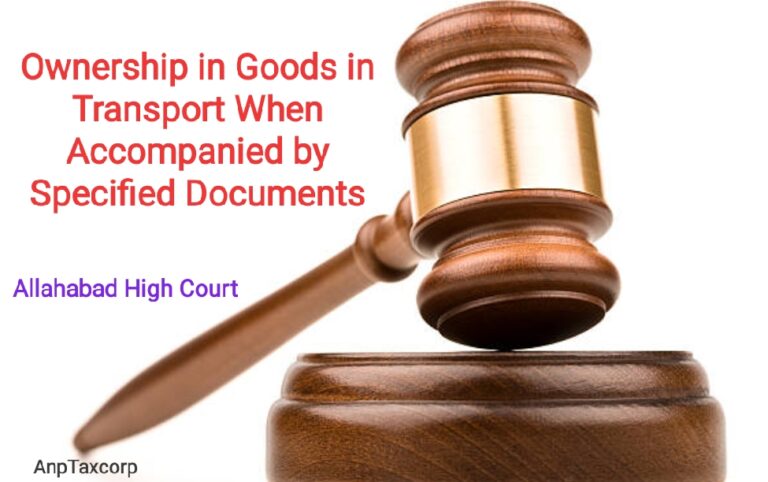In a recent ruling, the Allahabad High Court shed light on ownership determination in goods transportation concerning the Goods and Services Tax Act, 2017. The Court emphasized that when goods are accompanied by specified documents like invoices, either the consigner or the consignee is considered the owner of the goods. The penalty under Section 129(1)(a) of the GST Act should be imposed accordingly.
Case Background
The case involved a petitioner transporting goods for M/s Tata Steel Ltd. from Odisha to Pilkhua. Due to an engine breakdown in Jharkhand, there was a delay, causing the E-Way Bills to expire. Although the petitioner managed to extend one E-Way Bill, the GST portal didn’t allow extensions for the rest. Consequently, the goods were detained in Kanpur due to expired E-Way Bills.
The petitioner challenged an order dated 14.08.2023, imposing penalties under Section 129(1)(b) of the GST Act. The writ petition sought the release of the goods and the seized vehicle by accepting penalties under Section 129(1)(a) of the GST Act.
Allahabad High Court’s Judgment (Ownership of Goods in Transit)
The Court acknowledged the State’s objection regarding the availability of an appeal remedy under Section 107 of the Act. However, it was undisputed that the goods were accompanied by necessary documents. The Court referred to a relevant circular no-76 dated.31.12.2018 issued by the department, which clarified that the consigner or the consignee is deemed the owner if the specified documents accompany the consignment. The sixth issue of the circular is relevant in the present case and is extracted hereinafter.
| Issue | Clarification |
|
Who will be considered as the ‘owner of the goods’ for the purposes of Section 129 (1) of the CGST Act? |
It is hereby clarified that if the invoice or any other specified document is accompanying the consignment of goods, then either the consigner or the consignee should be deemed to be the owner. If the invoice or any other specified document is not accompanying the consignment of goods, then in such case, the proper officer should determine who should be declared as the owner of the goods. |
Considering this clarification and the facts of the case, the Court ruled that since the goods in transit were accompanied by the required documents, the department should have considered the petitioner’s request for the release of goods and the vehicle upon complying with Section 129(1)(a) of the Act.
Consequently, the writ petition was allowed.

Conclusion
The Allahabad High Court’s ruling provides clarity on the determination of ownership in goods transportation concerning the GST Act. When goods are accompanied by necessary documents, either the consigner or the consignee is recognized as the owner. This judgment underscores the importance of compliance with documentation requirements during the transportation of goods, ensuring smooth operations within the ambit of the law.
Case Title: Western Carrier India Ltd v. State Of U.P. And 4 Others [Writ Tax No. – 1020 of 2023]
Follow the Link to access the Circular No-76 dated.31/12/2018–https://www.cbic-gst.gov.in/pdf/Circular_76-50-2018_6_issues.pdf
You may also Like-https://anptaxcorp.com/cbdt-notifies-nbfc-classification-for-clause-da-of-section-43b/
Bombay High Court Rules in Favor of NRI in Section 54F Amendment Case
Telangana High Court mandates Faceless Notice for Income Tax Reassessment
